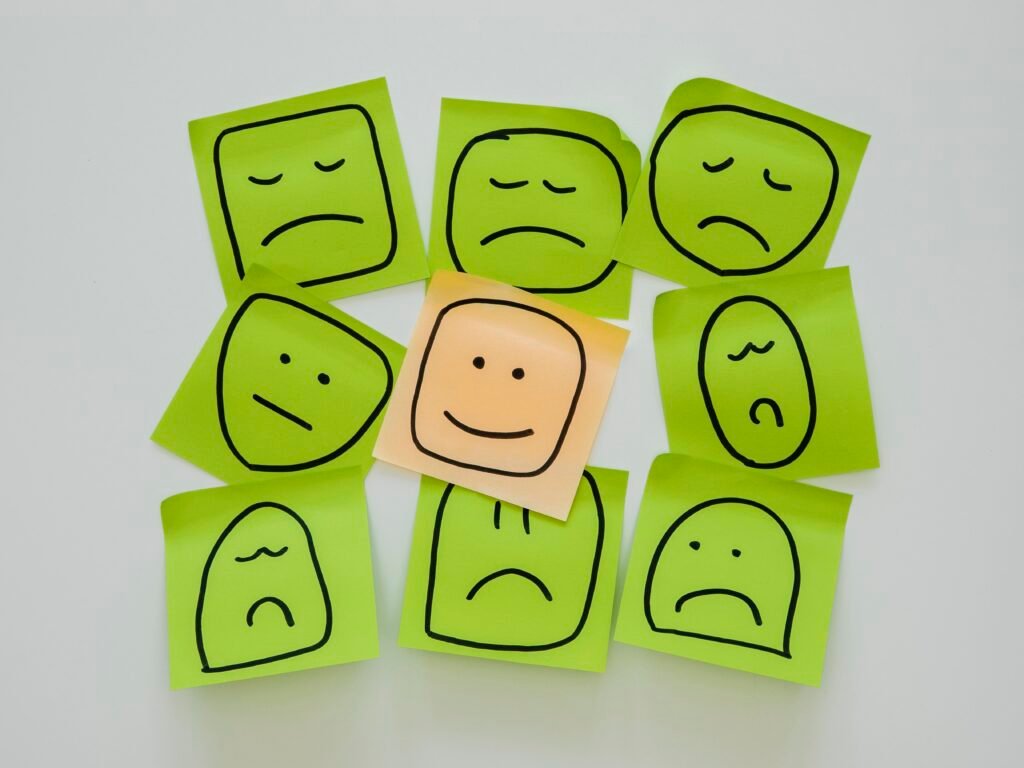What Is Feelings
What are the types of feelings about feelings are things that evoke different feelings and experiences. It is both mental and physical. Which affects various conditions and situations. These feelings can influence personal experiences and social situations.
Physiologically feelings can cause changes in various bodily experiences, such as changes in heart rate, breathing patterns, hormone levels, and muscle tension. Feelings thus play a crucial role in human experience and help us understand and cope with situations.
What are the types of feelings Basic

- Happiness
- Surprise
- Anger
- Disgust
- Fear
- Sadness
What are the types of feelings Others

- Love
- Amusement
- Enjoyment
- Contempt
- Embarrassment
- Excitement
- Guilt
- Pride achievement
- Relief
- Satisfaction
- Shame
- Confusion
- Shyness
- Self-hostility
- Anticipation
- Trust
- Jealousy
What are Complex Feelings
Complex feelings are feeling that are not easily understood because they involve many different feelings or conflicting thoughts. These feelings are not well understood, as they involve different and contradictory ideas being brought together. These often include feelings of happiness and sadness. At other times feelings or desires of opposite importance are given, so that ambivalent experiences arise in the mind. One needs introspection and self-awareness to understand these types of feelings. It takes time to understand them and often you have to know them in the back of your mind.
Elements of Feelings
Behavioral response:
– Behavioral response helps to understand the processes of human behavior and its circumstances.
– This element helps in understanding sensitivity, understanding, psychological processes, and mental states.
– This element helps in understanding every reaction and behavior of humans, which makes them effective in their ideal situation.
Physiological Response:
– This element helps in understanding the processes, treatment and shape of the body.
– It helps to understand body changes, pronunciation, clarity, ability.
– This element helps in understanding a person’s physical state, facial expressions, activities and movements.
Subjective Experience:
– This element helps in understanding one’s experiences, feelings and life.
– It helps to understand a person’s feelings, desires, future plans, and beliefs.
– This element helps in understanding human relationships, social activities, social influences and self satisfaction.
How Are Feelings Measured

Direct measurement of feelings is difficult because they are subjective and complex experiences. But researchers and psychologists use different techniques to measure and understand feelings:
Self-report measures: A popular technique is to use surveys, questionnaires, or scales to have people self-report their feelings. People can rate the degree, regularity, or feeling they experience.
Physiological measures: Measures of feeling that are most discussed in physiological terms include skin conductance, heart rate, facial expression, and brain activity. These changes can be measured by devices such as functional magnetic resonance imaging, face electromyography, galvanic skin response, and electrocardiogram.
Practical Assessment: How a person talks, walks, understands body language or facial expressions, environmental literacy. Researchers can look at movement patterns, language tones, body language or facial expressions for example.
Experience sampling method: This involves recording one’s feelings and experiences at specific intervals throughout the day using mobile apps or diaries. This provides more real-time data on emotional fluctuations.
Implicit measures: These assess unconscious or automatic emotional responses. They often involve tasks where participants respond quickly to stimuli, revealing implicit biases or emotional associations.
Psychological assessment: Some standardized tests, such as personality assessments or clinical interviews, include questions about feelings to measure emotional functioning.
Combining these methods allows researchers to gain a more comprehensive understanding of feelings, although none of them provide a complete measure in isolation.
Feelings Work In Our Body

Feelings are important life events, affecting our mental, social and physical circumstances. These feelings play a very important role in signaling our lifestyles and situations.
Mind: The center of spiritual realization is the mind. It has a special effect on brain function and mental capacity. These feelings originate in several brain regions, including the amygdala, hypothalamus, and prefrontal cortex.
Neurotransmitters: Neurotransmitters are important in mental and social health. It helps balance joy, happiness, excitement and restlessness.
Hormones: Hormones are also important in terms of spiritual health. Hormones like oxytocin are linked to feelings of trust and bonding, not just for the sake of it, but we can feel love and bond with friends and family.
Autonomic Nervous System (ANS): This system regulates vital signs such as breathing, digestion and heart rate.
Physical Feelings: Physical feelings including sweating, muscle tension, heart rate are influenced by psychological and social cues.
Cognitive Appraisal: Feelings influence our perceptions and psychological reactions.
Feedback loop: As more of these feelings and thoughts are incorporated, our reactions and actions change direction.
Thus, feelings are important life events that affect our mental, social, and physical cues. Understanding and controlling these processes is critical to the healing of our lives.
Feelings Effect Your Physical Health

Your physical well-being might be impacted by several feelings. It is displayed here.
- Blood pressure, heart disease, and digestive issues can all be impacted by stress and anxiety. This may cause symptoms including constipation, diarrhea, or abdominal pain.
- Diabetes, headaches, heart disease, and other conditions can all be made more likely by depression.
- Happy feelings have the ability to fortify internal strands, decreasing your ability to detect tiny injuries. Stress and unfavorable feelings can also deplete vitality and raise the risk of illness. We feel pain because we are in pain ourselves. Pain can be made worse by stress or thoughts of suicide.
- Fatigue can be impacted by stress, worry, and depression. may have an impact on the quality of sleep. has the potential to disrupt or cause insomnia by changing sleep patterns. One’s physical health may suffer from inadequate sleep.
- Food, exercise, and other lifestyle decisions can be influenced by feelings .
Mange Your Feelings

Managing your feelings is critical to emotional intelligence and well-being. Your feelings can influence our thoughts, behavior and actions with others. Managing them with ease leads to healthier relationships, improved decision-making, and greater satisfaction.
Here we will study various experiments and techniques for managing feelings in different situations.
Understanding Your Feelings: Understanding your feelings is the first step. Take time to identify and label your feelings. Do you feel angry, sad, anxious or happy? What experience does this emotion evoke in your body and how does it come into your body and mind? Reflect on it.
Acceptance and Validation: Acknowledging and validating inappropriate and unpleasant feelings is important. Avoid experiencing certain feelings. Remind yourself that all feelings are valid and serve a purpose.
Mindfulness and Self-Awareness: How to increase self-awareness and mindfulness and embrace good energy in your feelings. This process can give you support, understand causes and consequences, and help you find comfort.
Decision-making tool: As you manage feelings, consider how decisions affect your focus. Think about what you do in what contexts and how thoughtfully you accept it.
Treat Your Feelings: We will provide further support, guidance and questions to help plan how you can resolve your feelings. You can use different working hours and resources.
You’re ready and moving forward with help successfully managing your feelings!
Get Positive Feelings

There can be different ways to develop positive feelings. Below is an understanding of some of the key ways:
Meditation and Spiritual Practice: Practicing spirituality for meditation, mindfulness and peace of mind can be a great way to develop positive feelings.
Prayer: Participating in religious or spiritual fellowship can be a great way to be a positive influence.
Controlling your own state of mind: Practicing mindfulness to control your mental impulses and feelings and to moderate positive feelings.
Social Service and Cooperation: Helping others and contributing to society is conducive to developing positive feelings and satisfaction and prosperity of society.
It is important for these ways that we venture into each situation to make ourselves positive and satisfying.
FAQs
Q: Is it possible to regulate one’s feelings?
A: We can learn emotional management strategies even if we aren’t always able to control our initial feelings. Relaxation methods, mindfulness, and cognitive reappraisal are effective ways to manage feelings.
Q: Could you clarify how moods and sensations differ from each other?
A: Moods are less strong emotional states that may not be connected to a specific cause, whereas feelings are usually shorter-lived and more intense reactions to certain events or stimuli.
Q: Can feelings be detrimental?
A: Although feelings by themselves are not bad, how we express or repress them can have an impact on how we feel about ourselves. Chronic stress or unresolved anger, for instance, can exacerbate mental and physical health issues.
